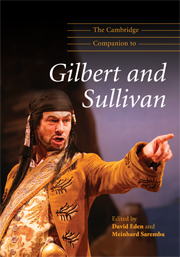Book contents
- Frontmatter
- Part I Background
- 1 Savoy opera and its discontents: the theatrical background to a quarrel
- 2 Identity crisis and the search for English opera: the Savoy Theatre in the 1890s
- 3 Resituating Gilbert and Sullivan: the musical and aesthetic context
- 4 ‘We sing as one individual’? Popular misconceptions of ‘Gilbert and Sullivan’
- Part II Focus
- Part III Reception
- Part IV Into the twenty-first century
- Appendix 1 Who wrote the overtures?
- Appendix 2 Stage and choral works by Arthur Sullivan and W. S. Gilbert
- Appendix 3 Modern editions of works by Arthur Sullivan and W. S. Gilbert
- Appendix 4 Sullivan's archetypes of English opera
- Notes
- Bibliography and further reading
- Index
- Plate section
4 - ‘We sing as one individual’? Popular misconceptions of ‘Gilbert and Sullivan’
from Part I - Background
Published online by Cambridge University Press: 28 September 2011
- Frontmatter
- Part I Background
- 1 Savoy opera and its discontents: the theatrical background to a quarrel
- 2 Identity crisis and the search for English opera: the Savoy Theatre in the 1890s
- 3 Resituating Gilbert and Sullivan: the musical and aesthetic context
- 4 ‘We sing as one individual’? Popular misconceptions of ‘Gilbert and Sullivan’
- Part II Focus
- Part III Reception
- Part IV Into the twenty-first century
- Appendix 1 Who wrote the overtures?
- Appendix 2 Stage and choral works by Arthur Sullivan and W. S. Gilbert
- Appendix 3 Modern editions of works by Arthur Sullivan and W. S. Gilbert
- Appendix 4 Sullivan's archetypes of English opera
- Notes
- Bibliography and further reading
- Index
- Plate section
Summary
As head of the Vienna Hofoper, Gustav Mahler developed his credo that in Each performance an opera has to be created anew. This led to his conviction: ‘What people of the theatre call tradition is nothing more than their laziness and their slipshod work’. This notion is especially relevant for branches of musical theatre where the shadows of ‘tradition’ are especially long and hauntingly darkening, as in the so-called Gilbert and Sullivan, or Savoy operas.
W. S. Gilbert suggested in an 1891 interview that ‘the burlesque stage was in a very unclean state’ and that he and Sullivan had made up their minds ‘to do all in our power to wipe out the grosser element’. Arthur Sullivan said in 1885 that in comic opera he ‘adhered to the principles of art which I had learned in the production of more solid works, and no musician who analyses the score of those light operas will fail to find the evidence of seriousness and solidity pointed out’. Gilbert believed that some of Sullivan's music was out of place in comic opera, and this is not surprising, considering that he seems to have been more concerned about burlesque and moral standards – ‘never to let an offending word escape our characters’ – whereas his collaborator reveals a wider range of artistic ambition. From the mid-1880s onwards there are repeated statements by Gilbert to the effect that the text ‘must be played exactly as I wrote it’. There is good reason to assume that this was not only due to issues of copyright but also because Gilbert, the librettist, feared losing control of the works. Usually the performers had to be true to the melodies but not necessarily the words, so he tried to take possession of the operas again as a producer.
- Type
- Chapter
- Information
- The Cambridge Companion to Gilbert and Sullivan , pp. 50 - 66Publisher: Cambridge University PressPrint publication year: 2009

